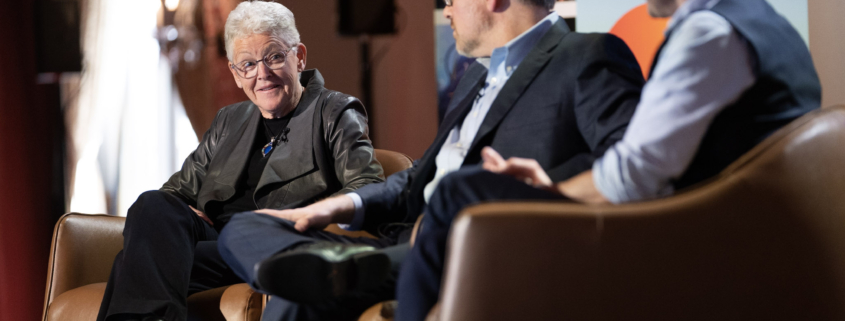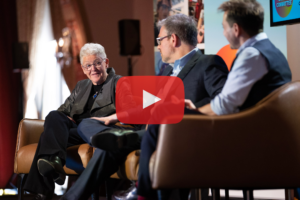The Politics of Climate – Panel 2
Having Productive Climate Conversations
Contrary to popular opinion, it is possible to have not only productive climate conversations from different points of view—but also possible to be surprised by how much you agree.
That was the conclusion reached during the panel “Finding Common Ground in Climate Conversations,” a discussion between Gina McCarthy, former EPA Administrator and White House National Climate Advisor in the first two years of the Biden administration, with conservative New York Times columnist Bret Stephens. The discussion was moderated by Dr. Joe Árvai, Director of the Wrigley Institute for Environmental Studies at the University of Southern California.
Arvai began the discussion by acknowledging the evolution in Stephens’ views on climate. Following a trip to Greenland last year, his skepticism changed.
“I wasn’t a climate skeptic in the sense that I denied the anthropogenic human-caused contributions to a warming planet. But I was skeptical about the consensus that this was not just a problem like many problems, but a unique global catastrophe,” he said. “What changed for me wasn’t really my understanding of the facts. What changed for me was my perception of risk.” After he was invited on a trip with oceanographer John Englander of the Rising Seas Institute, Stephens witnessed firsthand the visible evidence of the retreat of some of the largest glaciers in the world, “a moving and profound experience.” But before even taking the trip, he experienced the exchange of ideas with Englander to be intriguing, and appealing.
“The fact is that [Englander] did not approach me either as an imbecile or as a bad guy. He approached me as a guy he wanted to have a conversation with. And I think that’s really important when we have conversations across differences,” he said. “If you’re operating assumption is that someone who thinks differently from you must be stupid or must be bad, the conversation is going to be a failure at the start. If you go into the conversation, on the other hand, with a view that this person is not necessarily your enemy, this person might be coming from an honest place of doubt, then you’re likely to have a productive conversation. And in fact, that’s exactly what happened.”
McCarthy acknowledged that her own thinking has also changed over the years, as she saw how vital economics would be to the success of climate innovation – and the extent to which innovative technology could benefit the economy as well.
“It’s weird for me to say this, but I’m beginning to quote James Carville all the time. ‘It’s about the economy, stupid.’ Yes, it’s about health, it’s about the planet. But it’s a hugely winning framing when you have millions of people not working. When you can actually advance building in different ways, when you can rebuild roads and bridges to be more resilient, when you can actually preserve natural resource areas for yourself and your kids,” she said. “These are compelling issues that actually all follow how we thought the world could and should be given an opportunity to change, with the lens of understanding that climate change was no longer a sacrifice. It was the road to abundance. And what I’m seeing now is that businesses and private sector are jumping all over this.”
Arvai noted that it seemed as if the panelists were landing in a similar place with respect to the role that markets and business can play in climate innovation..
“Gina said something I agree with completely, and it’s also well and wisely put: the road to abundance,” Stevens said. “Part of the problem with a lot of the messaging around climate is basically, ‘Eat your broccoli. Consume less, walk lightly upon the Earth. The future is going to be one of less and less, and you just have to suck it up.’ That may make certain people feel virtuous, but I don’t think that’s a winning message for most people in the world who think their lives should be, as you said, more abundant than their parents’ were, and successively through generations.”
He pointed to innovations that are productive with an essentially invisible cost, like more energy-efficient homes, and better irrigation systems.
“It’s not going to come – and I say this with the highest respect for Gina — from the minds of clever EPA administrators. It’s going to come from entrepreneurs who are probably in this room [of college students] right now thinking about how they put their environmental passions together with their entrepreneurial abilities and find something nobody has thought of before.”
Both panelists agreed that action and solutions are more effective coming from the bottom up than the top down, and that policy nudges and incentives are more effective than regulations.
Arvai said he was proud to conclude that common ground had indeed been found between our panelists on climate. Which prompted laughter from both panelists, who said they were prepared to deny it.






